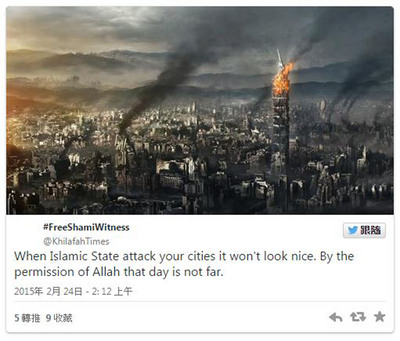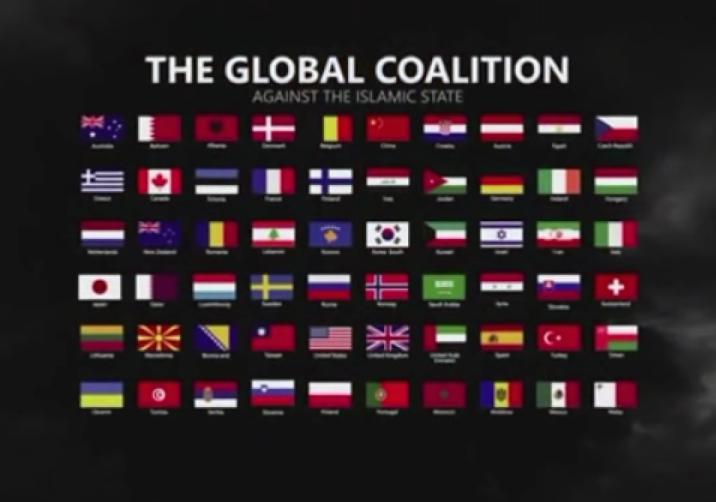by Garrett Dee
語言:
English
AT A PRESS conference in Kuala Lumpur addressing the role of the Asia-Pacific allies of the United States in combatting the growing international presence of ISIS, US President Barack Obama surprised audiences by including Taiwan amongst the countries he considers a part of the Asian anti-ISIS coalition. The declaration of Taiwan as an ally of the United States in an international coalition by a sitting US president has rare precedent and seems to have further complicated the diplomatic alignments of the region whilst simultaneously setting off a debate both within and without Taiwan about its role as a part of the international security system.
This abrupt recognition of Taiwan as an ally of the United States in this conflict has been met with far from universal acclaim, as concerns have been voiced about raising the profile of Taiwan in such a way as might actively endanger its national security. Security patrols have increased in frequency at major transit hubs like Taoyuan International Airport and various high-level government officials have called for people not to panic as the nation institutes farther reaching security measures. For its part, the role of Taiwan in advancing the agenda against the Islamic State in the most recent manifestation of this conflict appears limited to providing humanitarian aid and assistance to refugees, given its own limited military capabilities as well as the difficulty it faces in operating within international organizations.
 Image of a burning Taipei 101 posted by ISIS on Twitter earlier this year.
Image of a burning Taipei 101 posted by ISIS on Twitter earlier this year.
This limited support role, however, has not assuaged this worsening sense of national insecurity amongst the Taiwanese citizenry. Earlier this year, in February, the Islamic State posted an image on one of its Twitter accounts of a smoldering Taipei with a prominent portrayal of the Taipei 101 engulfed in flames. The caption underneath the image reads: “When the Islamic States attacks your cities, it won’t be pretty. By the permission of Allah, that day is not far.” The singling out of Taipei for such a provocative threat shocked the population and prompted Mayor Ko Wen-je to institute anti-disaster protocols, much to popular praise. Additionally, following the attacks on Paris and the beginning of its conflict with a French-led international coalition, ISIS released a video statement condemning the nations it perceives as united against it. In a still in which the group displays the flags of nations ISIS considers itself in conflict with, one can prominently see the ROC flag, situated to the immediate left of that of the United States.
In an ironic twist, the inclusion of the ROC flag amongst the states ISIS considers its enemies constitutes, in the estimation of Beijing, a recognition of Taiwan as a separate state. Though perhaps not purposeful, the placement of the ROC flag in relation to that of the US, while perhaps not bearing any symbolism, seems to cast a certain light on where the Islamic State places Taipei in terms of its strategic alliances. Such a move, though most certainly not the primary aim of ISIS when releasing the video, certainly raises alarms in Beijing as to the international recognition of Taiwan as a separate entity from China—even in the view of an organization such as the Islamic State.
 Note the positioning of Taiwan to the immediate left of the United States.
Note the positioning of Taiwan to the immediate left of the United States.
For its part, the United States’ recognition of Taiwan as an element of the coalition to oppose ISIS in the Asia-Pacific region perhaps serves the goal of moving it farther away from the PRC and into a closer (though unofficial) partnership with the US and its allies in the region. However, such a move comes at a time when the US has praised the movement towards what it perceives as a stable period in cross-strait relations. This is a view based on the perceived advancement in cooperation stemming from such events as the Ma-Xi meeting in Singapore last month, which, despite having generated quite a bit of controversy in Taiwan, found favor with many Western governments and media organizations. This sort of contradictory behavior seems to once again highlight the unclear intentions the United States has in regards to its expectation of Taiwan as an independent, yet subdued, member of the international system.
Equally striking as the mention of Taiwan by President Obama in his address to the ASEAN forum, however, is the complete lack of mention of China, despite its status as the largest military power in the region and its own declaration of war against ISIS following the execution of a Chinese aid worker who had been kidnapped in the region and held hostage and attacks on a hotel in Mali which killed at least three Chinese citizens.
Leaving China out of the coalition, though odd when juxtaposed with its own declaration of war against ISIS, is unsurprising when viewed through the lens of the larger historical trends of US-Chinese relations. That the United States would eschew military cooperation with China seems logical given the precarious contest of wills occurring between them in the South China Sea and other areas of contention. Additionally, China’s long-held policy of neutrality in such conflicts involving other nations will most likely prove unshakeable even in the face of the death of its own citizens, preventing it from committing a combat force proportionate to the robust size of its military.
In a clear show of where it considers its own friendships to lie, China recently announced it would team up with Russia in the fight against ISIS in coming weeks, though the extent of this partnership and China’s role in it remain unclear. Such a policy of providing support to another force without having to bear full burden of an assault on another nation seems pursuant to China’s preferred policy of non-intervention in international conflicts beyond its borders.
From another point of view, the United States may hesitate in cooperating with China in combatting extremism because of China’s dubious record in dealing what it considers extremism occurring within its own borders, particularly in Tibet and the Uighur portions of the Xinjiang region, which are predominately populated by Muslims. In the case of Xinjiang, where the Chinese government has at times denied those with face veils or long beards from boarding public transportation or obtaining travel documents. The situation in Xinjiang has long been labeled as a form of “domestic terrorism” occurring within Chinese borders and warranting harsh countermeasures. Agitation of the underlying issues in this conflict as a result of the actions of the Islamic State will most certainly spell further action by the government in Beijing to consolidate its power in the region.
As proven by the schism forming over the downing of a Russian fighter jet by Turkish forces near the Syrian border last week, the front against the security threat posed by ISIS is anything but united, and powerful nations will undoubtably use the conflict to push for their own agendas. In context of the Asia-Pacific region, that most likely means the United States attempting to bring its own allies even closer into its sphere of influence and further attempting to isolate China from participating in international coalitions. The PRC will for its part most likely refrain from committing too much manpower to the conflict, opting instead to let the West carry the brunt of what Beijing considers as the West’s own burden, much as it has behaved at any point when other nations decide to get entangled in the Middle East. China most likely will, however, use this opportunity to justify even harsher crackdowns on any activity it labels as extremist dissent occurring along its western borders.
In this midst of this struggle for coalition domination amongst larger nations, Taiwan finds itself in the precarious situation of having been singled out by both the Islamic State and the United States as an ally in the Western-led coalition, worsening relations with the PRC while at the same time igniting considerable fear concerning the safety of the nation. Once again, the position it finds itself placed in by more influential nations leaves Taiwan will little negotiating room to decide its own role in battling terrorism at home and abroad.


 Image of a burning Taipei 101 posted by ISIS on Twitter earlier this year.
Image of a burning Taipei 101 posted by ISIS on Twitter earlier this year. Note the positioning of Taiwan to the immediate left of the United States.
Note the positioning of Taiwan to the immediate left of the United States.